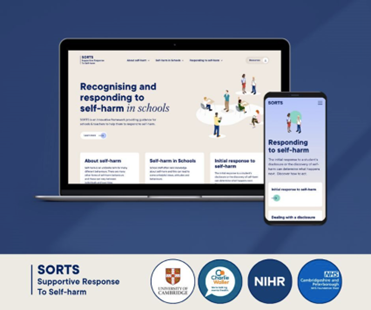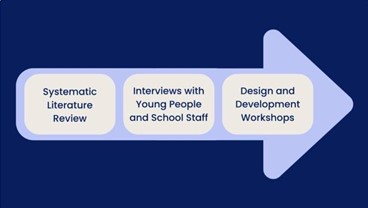Self-harm amongst adolescents is rising in prevalence (Hulbert et al, 2023), and there’s a lack of evidence-based, whole-school approaches to help college students and workers with their response to self-harm (Pierret et al, 2022). Entire college interventions embody a coordinated set of actions that align with the instructing curriculum, college ethos, atmosphere, and household and group partnerships (Goldberg et al., 2019). This weblog discusses the necessity for a whole-school strategy to self-harm coaching in colleges alongside the SORTS examine, which used co-production strategies to develop the Supportive Response to Self-Hurt in Colleges (SORTS) toolkit.

What’s the Want for Self-harm Coaching in Colleges?
Think about that you’re a instructing assistant and work intently with a pupil every day. The coed respects and trusts you, and at some point chooses to inform you that they’ve damage themselves deliberately. You might have obtained safeguarding coaching and know that you might want to cross this data on, however you will have by no means spoken to a scholar about self-harm earlier than or had any self-harm consciousness coaching. You could be apprehensive about what to say and should have a lot of questions – Why have they finished this? Are they susceptible to suicide? What ought to I say?
Faculty workers are essential adults in younger individuals’s lives and are sometimes the primary professionals to recognise self-harm behaviours of their college students (Berger et al., 2013). There are clear safeguarding procedures in place for workers to boost considerations a couple of scholar’s social, emotional or bodily wellbeing. Nevertheless, analysis exhibits that many college workers lack confidence in discussing self-harm, resulting in reactions of shock, panic and anxiousness throughout disclosures, all of which might affect an adolescent’s belief, willingness to share, and their beliefs about whether or not they are often helped (Finest, 2006; Downing & Doyle, 2016). These reactions are sometimes because of college workers missing understanding about self-harm, why it occurs and methods to finest reply (Evans et al., 2019; Colville et al., 2024, Berger et al, 2014). Coaching all college workers and delivering whole-school approaches to psychological well being has been demonstrated to supply small however important enhancements in college students’ social and emotional adjustment, behavioural adjustment and internalising signs (Goldberg et al., 2019). Coaching all college workers is essential as a result of help workers work alongside instructing workers to construct belief and rapport with college students (Littlecott et al., 2018). College students might due to this fact select to speak in confidence to any member of workers they belief, not solely instructing workers. Entire-school coaching may assist to advertise a shared understanding of the intervention and talk college values, each of that are essential for varsity tradition and efficient implementation (Moore et al., 2024). Pierret et al., (2022) discovered that coaching programmes can improve workers information and confidence in responding to self-harm, regardless of the dearth of evaluated self-harm coaching programmes and help instruments for varsity workers. The assessment beneficial that colleges undertake a whole-school strategy to self-harm and emphasised the significance of coaching all workers on methods to reply supportively to self-harm to assist cut back stigma.
SORTS – The evidence-based coaching programme and useful resource toolkit
In response to this unmet coaching want, we developed SORTS (Supportive Response to Self-harm in Colleges) for varsity workers to enhance their information of self-harm and confidence in responding to college students who self-harm (Burn et al., 2024a). It consists of three elements: a 30-minute e-learning module, a web site with data and movies, and downloadable assets for colleges to make use of.
The SORTS examine developed the coaching content material based mostly on current analysis proof and in collaboration with specialists from the Charlie Waller Belief and faculty psychological well being professionals (e.g. psychological well being leads, counsellors, therapists). The venture used a person-based strategy which concerned consulting with end-users (e.g. college workers) so as to add their viewpoint at each stage of the event course of (Yardley et al., 2015). The SORTS staff carried out focus teams and interviews with instructing and non-teaching college workers, in addition to younger individuals, to co-produce the toolkit.

The co-production of the web site and assets was important to making sure their acceptability and feasibility inside college settings. Coproduction workshops with college workers targeted on the comprehensiveness of the coaching content material, design and person engagement. Alongside the web site, a collection of assets have been co-produced with colleges, younger individuals and faculty psychological well being groups (Burn et al., 2024a). The data and help assets encourage a whole-school strategy by educating college students and oldsters on self-harm. Assets for varsity workers clarify self-harm behaviour, threat elements and methods to reply, in addition to specialised assets for psychological well being groups. All these assets are free, and downloadable straight from the web site.
Primarily based on person suggestions, we developed an entry-level e-learning module for all workers (Burn et al., 2024b). To foster a whole-school strategy to self-harm, the coaching is geared toward all members of workers, together with these from senior management groups (SLT), academics to administrative and catering workers. Throughout co-production, college workers felt it was essential for the e-learning module to advertise workers well-being alongside pupil wellbeing. In response to this, we ensured the module was of minimal time burden, contained solely important element on self-harm, signposted to further help and emphasised the broader skilled community that helps the pupil. The ultimate co-produced e-learning module takes round half-hour to finish to extend the feasibility and sustainability of the intervention inside a college setting (Han et al., 2005). All data is evidence-based and the module hyperlinks to analysis journals when acceptable. It consists of two co-produced video situations of student-staff conversations, which permit workers to mirror on how they’d reply to a discovery or disclosure of self-harm. The coaching consists of quiz questions so the learner can check their information all through and mirror on their attitudes about self-harm. Three secondary colleges supplied suggestions to tell ultimate corrections and decide preliminary effectiveness, one person reported the module was:
“Very considerate, insightful and accessible” – Supply: English Trainer – SORTS Focus Group.

Visuals from the two SORTs Movies
What’s subsequent for the SORTs venture?
While the SORTS module supplies some preliminary proof of acceptability by means of its inbuilt monitoring knowledge, it’s essential to additional consider the module’s affect on pupils and instructor outcomes. Gathering pre- and post-measures of instructor confidence and pupil well-being would offer additional proof on the effectiveness of the coaching module and perception into the implementation and sustainability of the toolkit inside colleges. A complete-school strategy to implementation is required, together with headteachers, SLT workers, and psychological well being results in help the coaching and its uptake (Moore et al., 2024). Primarily based on workers suggestions relating to feasibility, the module was developed to be not than half-hour. To make sure efficient implementation, time ought to be allotted for module completion throughout workers hours both as a part of inductions or on inset coaching days to proceed skilled growth. This permits workers to finish the module concurrently, which might result in group dialogue and simpler monitoring of the CPD certificates.
Trying ahead, co-production suggestions highlighted that SORTS might broaden additional to incorporate modules specializing in self-harm inside high-risk teams like LGBTQ+ populations (Batejan et al., 2015) and the interactions of self-harm with neurodiversity (Burn et al., 2024b) alongside additional help assets for siblings, friends and oldsters of somebody who’s self-harming.
Conclusions
A complete-school strategy to self-harm is important in supporting college students’ social, emotional and bodily well-being. The SORTS toolkit is an inclusive school-based coaching intervention consisting of a web site, e-learning module, and useful resource toolkit. It goals to equip all college workers with the required instruments and methods to recognise and successfully reply to college students who self-harm. The toolkit was co-produced with college workers, younger individuals, the Charlie Waller Belief, and psychological well being professionals at each step to make sure efficient implementation and sustainability of the coaching inside the college atmosphere.
For extra details about SORTS, please contact Principal Investigator: Dr Anne-Marie Burn – kinds@psychiatry.cam.ac.uk or go to https://sorts4schools.org.uk/
NB this weblog has been peer-reviewed
Conflicts of curiosity
Each Hayley Positive factors and Lauren Hitchcock have been concerned within the growth and co-production of SORTs throughout 2024.
References
- Batejan, Okay. L., Jarvi, S. M., & Swenson, L. P. (2015). Sexual orientation and non-suicidal self-injury: A meta-analytic assessment. Archives of Suicide Analysis, 19(2), 131-150. https://doi.org/10.1080/13811118.2014.957450
- Berger, E., Hasking, P., & Martin, G. (2013). ‘Take heed to them’: Adolescents’ views on serving to younger individuals who self-injure. Journal of adolescence, 36(5), 935-945. https://doi.org/10.1016/j.adolescence.2013.07.011
- Berger, E., Hasking, P., & Reupert, A. (2014). Response and coaching wants of faculty workers in the direction of scholar self-injury. Instructing and Trainer Schooling, 44, 25-34. https://doi.org/10.1016/j.tate.2014.07.013
- Finest, R. (2006). Deliberate self-harm in adolescence: A problem for colleges. British Journal of Steering & Counselling, 34(2), 161 – 175. https://doi.org/10.1080/03069880600583196
- Burn, A. M., Corridor, P., & Anderson, J. (2024a). An online-based coaching program for varsity workers to answer self-harm: design and growth of the supportive response to self-harm program. JMIR formative analysis, 8(1), e50024. https://doi.org/10.2196/50024
- Burn A.M., Positive factors H, Anderson, J., (2024b). A self-harm consciousness coaching module for varsity workers: Coproduction and person testing examine. JMIR Formative Analysis. https://doi.org/10.2196/preprints.69309
- Colville, L., Anderson, J. Okay., & Burn, A. M. (2024). How colleges can reply to pupils who self-harm: a qualitative examine with younger individuals and faculty workers. Emotional and Behavioural Difficulties, 29(3-4), 123-137. https://doi.org/10.1080/13632752.2024.2405806
- Dowling, S., & Doyle, L. (2016). Responding to self-harm within the college setting: the expertise of steerage counsellors and academics in Eire. British Journal of Steering & Counselling, 45(5), 583–592. https://doi.org/10.1080/03069885.2016.1164297
- Evans, R., Parker, R., Russell, A. E., Mathews, F., Ford, T., Hewitt, G., Scourfield, J., & Janssens, A. (2019). Adolescent self-harm prevention and intervention in secondary colleges: a survey of workers in England and Wales. Youngster and adolescent psychological well being, 24(3), 230–238. https://doi.org/10.1111/camh.12308
- Goldberg, J. M., Sklad, M., Elfrink, T. R., Schreurs, Okay. M., Bohlmeijer, E. T., & Clarke, A. M. (2019). Effectiveness of interventions adopting a complete college strategy to enhancing social and emotional growth: a meta-analysis. European Journal of Psychology of Schooling, 34, 755-782. https://doi.org/10.1007/s10212-018-0406-9
- Han, S. S., & Weiss, B. (2005). Sustainability of instructor implementation of school-based psychological well being packages. Journal of Irregular Youngster Psychology, 33, 665-679. https://doi.org/10.1007/s10802-005-7646-2
- Hulbert, S., Eida, T., Ferris, E., Hrytsenko, V., & Kendall, S. (2023). HBSC England Nationwide Report: Findings from the 2001-2022 HBSC examine for England Well being Behaviour in Faculty-aged kids (HBSC). College of Kent.
- Littlecott, H. J., Moore, G. F., & Murphy, S. M. (2018). Scholar well being and well-being in secondary colleges: the function of faculty help workers alongside instructing workers. Pastoral Care in Schooling, 36(4), 297-312. https://doi.org/10.1080/02643944.2018.1528624
- Moore et al, (2024). Assessment of Proof on Implementation in Schooling. Schooling Endowment Basis. https://d2tic4wvo1iusb.cloudfront.internet/manufacturing/paperwork/pages/eef_implementation_in_education_evidence_review_-_april_2024.pdf?v=1741867409
- Pierret, A. C., Anderson, J. Okay., Ford, T. J., & Burn, A. M. (2022). Schooling and coaching interventions, and help instruments for varsity workers to adequately reply to younger individuals who disclose self‐hurt–a scientific literature assessment of effectiveness, feasibility and acceptability. Youngster and adolescent psychological well being, 27(2), 161-172. https://doi.org/10.1111/camh.12436
- Yardley, L., Morrison, L., Bradbury, Okay., & Muller, I. (2015). The person-based strategy to intervention growth: utility to digital health-related behaviour change interventions. Journal of medical Web analysis, 17(1), e4055. https://doi.org/10.2196/jmir.4055
In regards to the authors

Hayley is a Analysis Assistant within the Youngster & Adolescent Resilience and Psychological Well being staff, based mostly within the Division of Psychiatry on the College of Cambridge. Hayley’s coaching is in Psychology (BSc Hons) and Psychological Analysis Strategies (MSc). She has delivered psychological well being intervention research focusing on kids’s self-regulation, anti-bullying, depressive signs, involvement with the felony justice system and self-harm behaviours.

Lauren is an undergraduate placement scholar working inside the Youngster & Adolescent Resilience and Psychological Well being analysis staff, based mostly within the Division of Psychiatry on the College of Cambridge. Lauren is at the moment finding out for a BSc Psychology with Criminology diploma at Loughborough College. She works on research investigating self-harm behaviours inside college contexts and the usage of digital well being interventions inside psychological well being companies.


